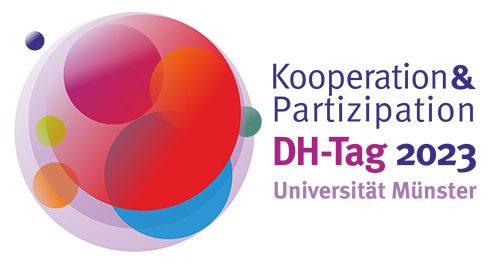DH Day 2023
8 December 2023 - Cooperation and Participation in the Digital Humanities

The DH Day 2023 is documented on zenodo.org.
Research in the digital humanities is a collaborative endeavour. Digitally oriented research projects usually have a wide range of tasks, each of which requires very different competences. The distribution of tasks among different minds and the associated close cooperation across disciplinary boundaries pose new challenges for research in the humanities. Cooperation with partners outside of one's own discipline requires special care, the communicative effort is often higher: one must understand the other person with his or her competences, cognitive interests and objectives and also be able to express one's own motivations in such a way that joint work becomes possible. The basic principle is to find a common language.
In the digital humanities, two disciplinary boundaries are regularly crossed: Firstly, the collaboration of experts trained in the humanities with research software engineers presupposes a negotiation of the boundaries between natural science and humanities methods and procedures. The methodologically oriented discourse also regularly crosses the boundaries between the individual disciplines of the humanities:
Historical and linguistic projects talking together about manuscript recognition or data modelling, theological and archaeological projects aiming at mapping and thus visualising historical events, social science tagging procedures and literary science annotations, etc. Between all these and other disciplinary works and cognitive interests there are overlaps and common activities that can be fertilised through dialogue.
Finally, a completely different kind of cooperative boundary crossing takes place within the framework of citizen science: Participatory cooperation with people outside the academic core opens up science in the direction of society (which usually finances this science). Between the pure delivery of data by laypersons and the cooperative collaboration on an equal footing, characterised by recognition, there is a wide participatory field that needs to be smoothed in communicative terms.
The 5th DH Day at the University of Münster would like to address this topic area and ask about cooperative and participatory structures in digital humanities projects carried out on site (and beyond). We will meet on Friday, 8.12.2023 for lectures, discussions, the traditional poster slam and overall a hopefully cooperative and participatory exchange.

